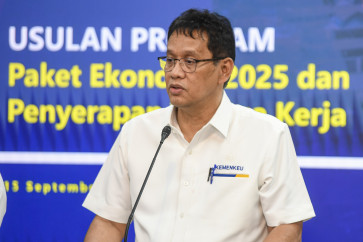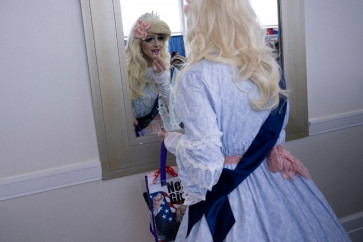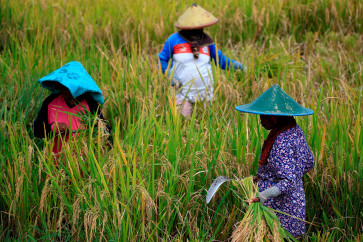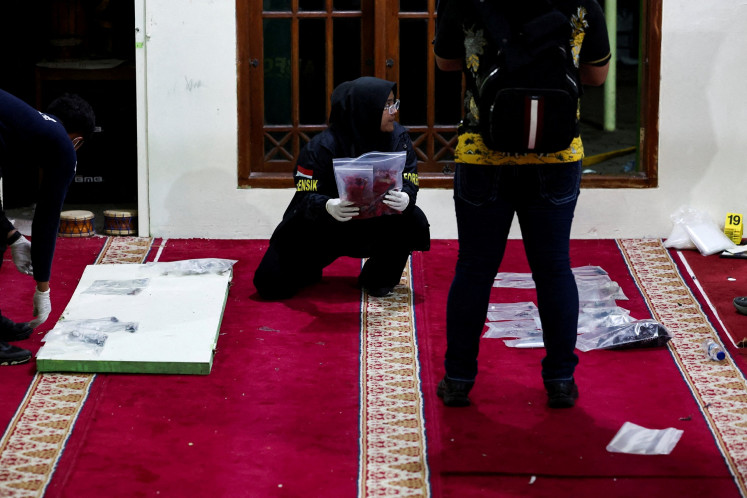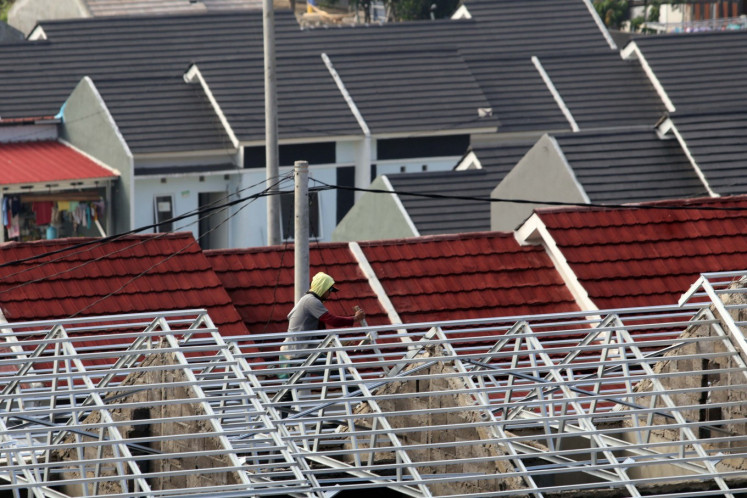Popular Reads
Top Results
Can't find what you're looking for?
View all search resultsPopular Reads
Top Results
Can't find what you're looking for?
View all search resultsIndonesia showcases its blue economy projects in fisheries at FAO
Blue economy concept: FAO Director General Jose Garcia de Silva (3rd from left) opens the 31st meeting of the Committee on Fisheries in Rome on Monday
Change text size
Gift Premium Articles
to Anyone
 Blue economy concept: FAO Director General Jose Garcia de Silva (3rd from left) opens the 31st meeting of the Committee on Fisheries in Rome on Monday. Indonesia showcased on the sideline of the meeting its blue economy concept in West Nusa Tenggara and Bali, featuring an integrated, upstream and downstream, development program covering tuna fisheries, aquacultures, marine tourism, salt and pearl industries. (Courtesy of FAO) (3rd from left) opens the 31st meeting of the Committee on Fisheries in Rome on Monday. Indonesia showcased on the sideline of the meeting its blue economy concept in West Nusa Tenggara and Bali, featuring an integrated, upstream and downstream, development program covering tuna fisheries, aquacultures, marine tourism, salt and pearl industries. (Courtesy of FAO)
Blue economy concept: FAO Director General Jose Garcia de Silva (3rd from left) opens the 31st meeting of the Committee on Fisheries in Rome on Monday. Indonesia showcased on the sideline of the meeting its blue economy concept in West Nusa Tenggara and Bali, featuring an integrated, upstream and downstream, development program covering tuna fisheries, aquacultures, marine tourism, salt and pearl industries. (Courtesy of FAO) (3rd from left) opens the 31st meeting of the Committee on Fisheries in Rome on Monday. Indonesia showcased on the sideline of the meeting its blue economy concept in West Nusa Tenggara and Bali, featuring an integrated, upstream and downstream, development program covering tuna fisheries, aquacultures, marine tourism, salt and pearl industries. (Courtesy of FAO)
B
span class="caption">Blue economy concept: FAO Director General Jose Garcia de Silva (3rd from left) opens the 31st meeting of the Committee on Fisheries in Rome on Monday. Indonesia showcased on the sideline of the meeting its blue economy concept in West Nusa Tenggara and Bali, featuring an integrated, upstream and downstream, development program covering tuna fisheries, aquacultures, marine tourism, salt and pearl industries. (Courtesy of FAO)
Indonesia showcased at the Food and Agriculture Organization of the United Nations here on Monday its blue economy concept in East Lombok and Central Lombok, Province of West Nusa Tenggara, and Nusa Penida, Bali, featuring an integrated, upstream and downstream, development program covering tuna fisheries, aquacultures, marine tourism, salt and pearl industries.
'The Lombok project, implemented in cooperation with FAO, is based on the principles of sustainability, nature's efficiency, zero waste and social inclusiveness,' noted Achmad Poernomo, chief of the Research and Development Agency, Ministry of Marine Affairs and Fisheries.
Indonesia presented its blue economy (blue growth) projects on a special event on the sideline of the five-day session of the 140-member FAO Committee on Fisheries beginning on Monday as part of its campaign to convince the market that it is striving hard to implement sustainable fisheries.
'Our fish exports to Europe, our second largest market after Japan and the United States, have been put under increasingly stringent scrutiny, subjected to sustainability certification,' Poernomo later told The Jakarta Post.
Latest data at the ministry showed Indonesian fish exports, mostly tuna, to Europe (EU), amounted to about US$530 million last year or around 15 percent of total exports.
FAO Director of Fisheries and Aquaculture Resources Indroyono Susilo, who chaired the special session, considered Indonesia's decision to pursue the blue-growth concept in marine fisheries as quite strategic.
Indroyono said as the world's largest archipelagic nation, with more than 13,400 islands, 5.9 million square kilometers of territorial waters and exclusive economic zone and 81,000 kilometer long coastline, Indonesia would gain greatly from the promotion of the blue economy concept.
The green growth principle also has grown increasingly popular worldwide under a strong campaign by FAO, he added.
'The ratitonale of this blue economy concept is that three quarters of the earth's surface is covered by oceans and seas, which are both an engine for global economic growth and a key source of food security," Indroyono pointed out.
Ealier at the opening of the plenary session of the meeting FAO Director General Jose Graziano da Silva warned that overfishing, pollution and climate change are putting this vitality at risk and the impacts are already evident.
"I want to stress the urgency of individual and collective action to address climate change, one of the most pressing challenges the world faces today," Graziano da Silva said, pointing out that FAO was making it a priority in its work to improve sustainable development through its Blue Growth Initiative.
FAO has embraced the blue economy concept into its Global Initiative on Blue Growth in support of food security, poverty alleviation and sustainable management of aquatic resources.

